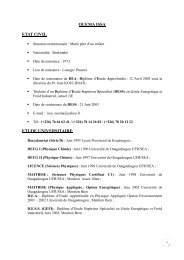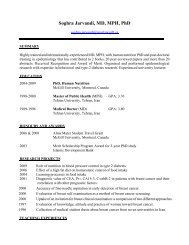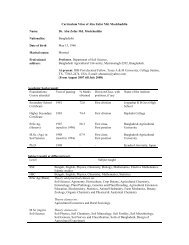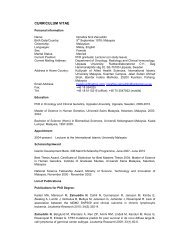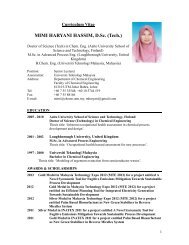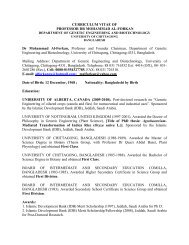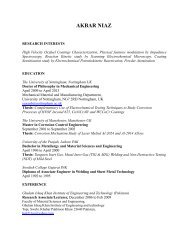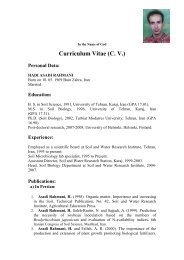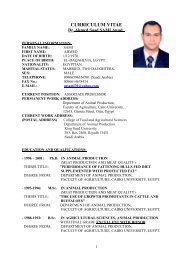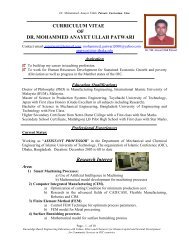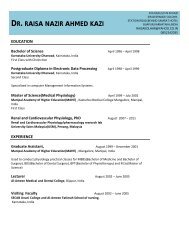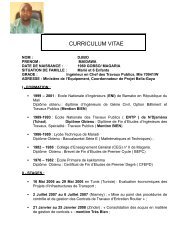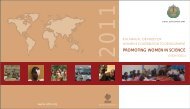Engineering: issues, challenges and opportunities for development ...
Engineering: issues, challenges and opportunities for development ...
Engineering: issues, challenges and opportunities for development ...
You also want an ePaper? Increase the reach of your titles
YUMPU automatically turns print PDFs into web optimized ePapers that Google loves.
ENGINEERING AROUND THE WORLD5.3Country perspectives5.3.1AfricaCôte d’IvoireIssié Yvonne GueyeIntroductionIn the 1960s <strong>and</strong> 1970s engineering ef<strong>for</strong>ts in the Côte d’Ivoirefocused on civil <strong>and</strong> agricultural engineering. After the military-politicalcrisis faced <strong>for</strong> six years, Côte d’Ivoire is now ata crossroads economically, politically <strong>and</strong> technologically. Tothrive, <strong>and</strong> given the needs <strong>for</strong> reconstruction <strong>and</strong> sustainable<strong>development</strong>, it is imperative that renewed ef<strong>for</strong>ts are placedon engineering, particularly with regards to internationalst<strong>and</strong>ards, to allow the country to become part of the globalknowledge <strong>and</strong> in<strong>for</strong>mation society. <strong>Engineering</strong> electricalengineering has an important role to play as it adds value tolong-term <strong>development</strong> <strong>and</strong> speeds up poverty reduction.EconomyThe economy of the Côte d’Ivoire is broadly split between agricultureat 22 per cent, industries at 26 per cent <strong>and</strong> servicesat 52 per cent of GDP. Some 34 per cent of the populationis engaged in subsistence farming. The country is orientedtowards private enterprise, with government participationthrough parastatal companies. Multinational corporations areinvolved in two-thirds of the largest businesses in such areasas construction, energy, petroleum, construction <strong>and</strong> foodprocessing.For many years, Ivorian engineers were highly regarded <strong>and</strong>enjoyed good job security, partly due to the influence <strong>and</strong>the lobbying of the Federation of <strong>Engineering</strong> Organizations(FIACI); most high positions in government as well as in public<strong>and</strong> private companies were held by engineers. For example,from 1975 to 2002 many members of the board of FIACIworked in the ministries of infrastructure, telecommunicationsor agriculture.Engineers today work mainly in public <strong>and</strong> private companies<strong>and</strong> consulting firms of the country, in similar sectors such asagriculture <strong>and</strong> food processing, construction <strong>and</strong> civil engineering,energy, petroleum, chemistry <strong>and</strong> mining, computing<strong>and</strong> communications <strong>and</strong> industrial processing. According tothe available data, as of 2002, 86 engineers made up 1.2 per centof the working population.86 Kouassi, L. <strong>and</strong> Amani, M. 2002. Recensement général de la population et de l’habitationde 1998. Institut National de la Statistique, Vol. IV, Analyse des résultats, août 2002.Higher EducationEarly in the 1960s, the Côte d’Ivoire developed a long-termstrategy to build technological capacities to meet the <strong>challenges</strong>of national <strong>development</strong>. Professional technical centres<strong>and</strong> technical high schools were established to meet industry’sdem<strong>and</strong> <strong>for</strong> technicians <strong>and</strong> to prepare youth towardsengineering careers. The route to higher education is throughfour years of secondary school <strong>and</strong> three years to baccalaureaterequired <strong>for</strong> entry into universities or Gr<strong>and</strong>es Ecoles. TheGr<strong>and</strong>es Ecoles were created to develop senior technicians <strong>and</strong>engineers, with the first of these established in 1962 <strong>for</strong> civilengineering sciences, with extensions to geology <strong>and</strong> miningavailable from 1973. The first national university openedin Abidjan in 1964, followed by three specialized provincialannexes. The national Institute of Technical Education, theSchool of Agricultural <strong>Engineering</strong> <strong>and</strong> the School of Statistics<strong>and</strong> Economy were also launched. Private universities emergedto absorb the growing number of c<strong>and</strong>idates, <strong>and</strong> trained twoyeardegree technicians in various fields.Data from 2005 shows that higher education in the Côted’Ivoire comprises: three public autonomous universitieswith 69,436 students; six private universities with 2,209 students;four public Gr<strong>and</strong>es Ecoles with 10,150 students;<strong>and</strong> 108 private Gr<strong>and</strong>es Ecoles with 94,745 students. Thesestructures fall under the remit of the Ministry of Higher Education.87 88 In addition, there are twenty-eight centres givingpost-baccalaureate professional <strong>and</strong> technical trainingto 15,604 students. These are under the remit of the Ministryof Technical Education. In sum, 192,144 students are inhigher education. Women make up 29.7 per cent of this total.According to national statistics, 8 per cent of the populationhave gone through higher education.New <strong>and</strong> next stepsTo better engage in the global economy <strong>and</strong> to accompany theindustrialization process, the government has initiated policiesto encourage innovation, covering areas such as taxation <strong>and</strong>intellectual property. For example, the Ivorian Office of IntellectualProperty 89 (a member of the African Office of IntellectualProperty <strong>and</strong> the World Organization <strong>for</strong> IntellectualProperty) was created in 2005 charged with promoting inven-87 Ministère de l’enseignement Supérieur: Direction de la Planification et de l’Evaluation,Statistiques 2004–2005. For more in<strong>for</strong>mation: http://www.afristat.org/index.php?option=com_content&view=article&id=404&Itemid=58&pays=CI (Accessed: 15May 2010).88 Ministère de l’enseignement Supérieur: Direction des Enseignements SupérieursPrivés. Statistiques 2006–2007.89 Office Ivoirien de la Propriété Intellectuelle, Documents de Présentations et Publications.213



